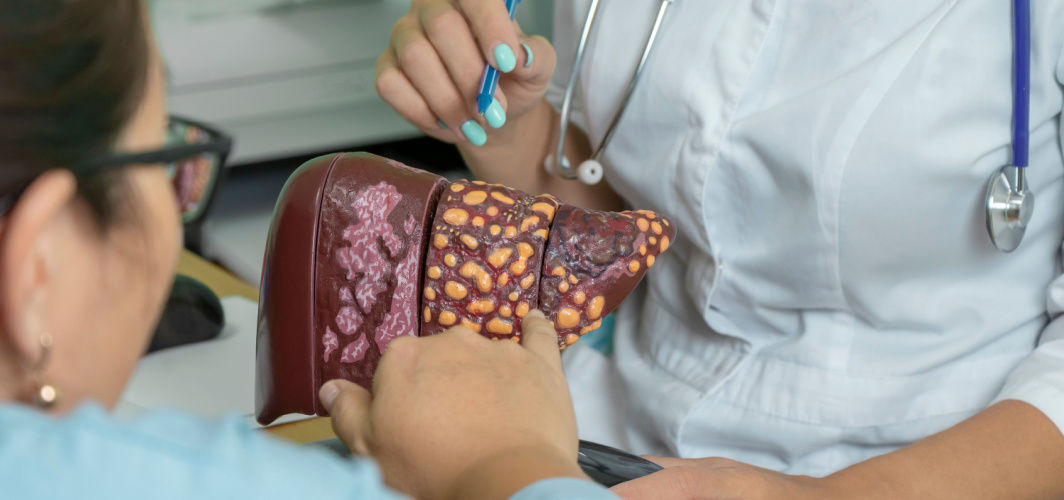General Health
Cirrhosis Of Liver: Symptoms, Causes, Diagnosis, Treatment, Prevention
8 min read
By Apollo 24|7, Published on - 14 July 2023, Updated on - 17 July 2023
Share this article
0
0 like

Cirrhosis of the liver is a serious medical condition that affects millions of people worldwide. Cirrhosis is characterised by the gradual deterioration and scarring of liver tissue, leading to impaired liver function. Cirrhosis can be caused by various factors, such as excessive alcohol consumption, chronic viral hepatitis or non-alcoholic fatty liver disease.
The prevalence of cirrhosis is on the rise, mainly due to the increasing incidence of non-alcoholic fatty liver disease (NAFLD) and viral hepatitis. Unhealthy lifestyle habits, such as a sedentary lifestyle, poor dietary choices and obesity, contribute to the development of NAFLD, which can later progress to cirrhosis.
If left undiagnosed, cirrhosis can lead to severe complications like liver cancer, hepatic encephalopathy (brain dysfunction) or even liver failure. Therefore, it is crucial to raise awareness about this condition and promote early detection and intervention.
What is Cirrhosis of the Liver?
Cirrhosis of the liver is a serious and potentially life-threatening condition, which has become a leading cause of morbidity and mortality worldwide. This progressive disease characterised by the irreversible scarring of liver tissue hinders the normal functioning of the liver.
Understanding cirrhosis of the liver and its associated aspects is crucial for several reasons, which include the following:
- Early detection: Recognising the symptoms and risk factors can lead to early diagnosis and intervention, which can improve outcomes.
- Improved treatment options: Being aware of the available treatment options can help individuals make informed decisions about their healthcare.
- Lifestyle modifications: Knowing the preventive measures can enable individuals to take proactive steps to reduce their risk of developing cirrhosis.
Liver Cirrhosis Symptoms
In the early stages of cirrhosis, individuals may experience the following:
- Fatigue and weakness
- Loss of appetite and weight loss
- Nausea and vomiting
These symptoms are often non-specific and can be overlooked or attributed to other causes. However, it is important not to ignore them, especially if they persist or worsen over time.
As cirrhosis progresses, more advanced symptoms may manifest, which include the following:
- Jaundice (yellowing of the skin and eyes)
- Swelling in the abdomen and legs
- Mental confusion and concentration problems
Liver Cirrhosis Causes
There are several causes of cirrhosis of the liver, and understanding them can help in prevention and early intervention. Let us explore some of the most common causes:
1. Excessive Alcohol Consumption
Heavy and prolonged alcohol consumption is one of the leading causes of liver cirrhosis, which can damage liver cells, leading to inflammation and scarring over time.
2. Chronic Viral Hepatitis
Infection with hepatitis B or C viruses can cause chronic inflammation in the liver, leading to cirrhosis if left untreated.
3. Non-Alcoholic Fatty Liver Disease (NAFLD)
This condition occurs due to the accumulation of fat in the liver and is usually associated with obesity, diabetes or high cholesterol levels, which can progress to cirrhosis.
4. Autoimmune Diseases
Certain autoimmune diseases, such as autoimmune hepatitis and primary biliary cholangitis, can directly attack and damage liver cells, eventually causing cirrhosis.
5. Genetic Disorders
Inherited conditions like hemochromatosis (excessive iron accumulation), Wilson's disease (copper accumulation) and alpha-1 antitrypsin deficiency (abnormal protein production) can lead to liver cirrhosis.
6. Medications and Toxins
Prolonged exposure to certain medications, toxins or chemicals can cause liver damage and subsequent cirrhosis.
Other factors contributing to cirrhosis include fatty liver disease due to malnutrition, cystic fibrosis, bile duct disorders and certain rare metabolic diseases.
Diagnosis of Cirrhosis of Liver
Several methods are used to accurately identify and assess liver cirrhosis. Let us take a closer look at some of these diagnostic tools:
Physical examination and medical history
This is often the first step in diagnosing liver cirrhosis. Your doctor will examine you for signs such as a swollen abdomen, jaundice and changes in your mental state. They will also review your medical history and ask about any symptoms you may be experiencing.
Blood tests
1. Liver function tests: Liver function tests measure the levels of certain enzymes and proteins in your blood that indicate how well your liver is functioning.
2. Viral hepatitis screening: Hepatitis B and C viruses can cause cirrhosis, so screening for these viruses is important.
3. Complete blood count (CBC) and clotting tests: CBC & clotting tests can help determine whether there is any abnormal bleeding or clotting occurring.
Imaging tests
1. Ultrasound: This non-invasive test uses sound waves to create images of your liver and can help detect signs of cirrhosis.
2. CT scan or MRI: These tests provide more detailed images of the liver and can help evaluate the extent of organ damage.
Liver biopsy
In some cases, a small sample of liver tissue may be taken for a closer examination under a microscope. This can confirm the diagnosis of cirrhosis and provide information about its severity.
Liver Cirrhosis Treatment
It is important to follow a comprehensive treatment plan in order to manage symptoms and prevent complications.
LIFESTYLE CHANGES
Lifestyle changes and self-care measures play a crucial role in the treatment of liver cirrhosis. Here are some key points to consider:
1. Alcohol cessation or moderation
If alcohol is the underlying cause of cirrhosis, it is essential to completely stop drinking or limit alcohol intake to a moderate level.
2. Consuming a healthy diet and weight management
A well-balanced diet, rich in fruits, vegetables, whole grains and lean proteins, can help support liver health. Additionally, maintaining a healthy weight can reduce the strain on the liver.
3. Regular exercise and physical activity
Engaging in regular exercise can not only improve overall health but also help manage complications associated with cirrhosis, such as muscle wasting and insulin resistance.
MEDICATIONS
In addition to lifestyle changes, medications can be prescribed to manage symptoms and complications of cirrhosis. Some commonly used medications include:
1. Diuretics
Diuretics help remove excess fluid from the body, reducing swelling in the legs and abdomen.
2. Beta-blockers
Beta-blockers are used to lower blood pressure in the portal vein, thus preventing bleeding from the blood vessels.
3. Ursodeoxycholic acid
This medication helps improve bile flow, which can be impaired in cirrhosis.
SURGERY
If necessary, certain procedures and surgeries may be recommended for advanced cases of cirrhosis, which include the following:
1. Paracentesis for fluid removal
In cases of significant fluid accumulation in the abdomen (ascites), a procedure called paracentesis may be performed to drain the fluid.
2. Transjugular intrahepatic portosystemic shunt (TIPS)
TIPS is a procedure that creates a pathway for blood diversion, reducing pressure in the portal vein.
3. Liver transplantation
In severe cases of cirrhosis, where the liver is extensively damaged and cannot function properly, a liver transplant may be considered as a last resort.
Prevention of Cirrhosis of the Liver
To prevent cirrhosis of the liver, it is important to take certain precautions and make healthy lifestyle choices. Here are some key steps you can take to reduce your risk:
- Limit alcohol consumption or abstain completely: Excessive alcohol consumption is one of the leading causes of cirrhosis. It is advisable to limit alcohol intake or completely abstain if you have a history of liver disease or are at risk.
- Practise safe sex and avoid sharing needles: Viral hepatitis infections, specifically hepatitis B and C, can lead to chronic liver disease and cirrhosis. To prevent these infections, use condoms or other barrier methods while having sex and avoid sharing needles.
- Maintain a healthy weight and manage diabetes: Obesity and diabetes are risk factors for cirrhosis. Maintaining a healthy weight through regular exercise and a balanced diet can help protect your liver. It is also important to manage diabetes effectively to reduce the risk of liver damage.
- Get vaccinated against hepatitis B: Vaccination against hepatitis B can significantly reduce the risk of developing chronic hepatitis, which can progress to cirrhosis.
- Avoid exposure to toxic substances and chemicals: Certain chemicals and toxins like dry cleaning solvent carbon tetrachloride can damage the liver and increase the risk of cirrhosis. Take necessary precautions at work or home to avoid exposure to harmful substances.
By following these preventive measures, you can reduce your risk of developing cirrhosis of the liver and maintain a healthy liver for a lifetime.
Takeaway
Cirrhosis of the liver is a serious condition that can have long-term effects on your health if left untreated. Early detection of cirrhosis is vital for effective management and prevention of complications. Regular screenings and check-ups can help in detecting cirrhosis at an early stage. By empowering individuals to make lifestyle changes and promoting awareness about liver health, we can collectively reduce the burden of risk factors for liver disease. If you are experiencing any symptoms or have risk factors for liver disease, it is important to seek medical help promptly.
To ensure your liver health, book Apollo Liver Check Package
FAQs
Q. Can liver cirrhosis be reversed?
Unfortunately, once developed, liver cirrhosis cannot be completely reversed. However, early detection and prompt treatment can slow down the progression of the disease and prevent further damage to the liver.
Q. Is liver cirrhosis always caused by alcohol abuse?
No. Although excessive alcohol consumption is a common cause of liver cirrhosis, other factors such as viral infections, fatty liver disease and certain genetic disorders can also lead to this condition.
Q. Can liver cirrhosis be prevented?
Yes, certain lifestyle changes such as limiting alcohol consumption can help you reduce the risk of developing liver cirrhosis.
Q. What are the complications of liver cirrhosis?
Liver cirrhosis can lead to several complications, including hypertension, fluid build-up in the abdomen, loss of brain function, enlargement of oesophageal blood vessels and liver cancer.
Q. What are the treatment options for liver cirrhosis?
Treatment for liver cirrhosis may involve lifestyle modifications, medications to manage symptoms and reduce complications, treating underlying causes and liver transplantation.
Medically reviewed by Dr Sonia Bhatt.
General Health
Consult Top Dietitians
View AllLeave Comment
Recommended for you

General Health
A Pill To Replace Exercise: Scientists Discovered A Drug That Mimics Effects Of Sports
To help those who cannot exercise enough due to medical reasons, researchers have identified a drug that can replicate the effect of exercising on the body.

General Health
The Role of Protein in a Balanced Diet: Striking the Right Nutritional Balance
Discover how protein contributes to a balanced diet, essential for optimal nutrition. Explore the importance of dietary protein in maintaining health.

General Health
Coughing Up Blood? You Might Be Having These Health Issues
Hemoptysis, or the presence of blood in a cough, may signal some serious medical issues. If you notice any such symptom, consult a doctor immediately to get the underlying cause diagnosed.
Subscribe
Sign up for our free Health Library Daily Newsletter
Get doctor-approved health tips, news, and more.
Visual Stories

Science-backed Home Remedies for Burns and Blisters
Tap to continue exploring
Recommended for you

General Health
A Pill To Replace Exercise: Scientists Discovered A Drug That Mimics Effects Of Sports
To help those who cannot exercise enough due to medical reasons, researchers have identified a drug that can replicate the effect of exercising on the body.

General Health
The Role of Protein in a Balanced Diet: Striking the Right Nutritional Balance
Discover how protein contributes to a balanced diet, essential for optimal nutrition. Explore the importance of dietary protein in maintaining health.

General Health
Coughing Up Blood? You Might Be Having These Health Issues
Hemoptysis, or the presence of blood in a cough, may signal some serious medical issues. If you notice any such symptom, consult a doctor immediately to get the underlying cause diagnosed.